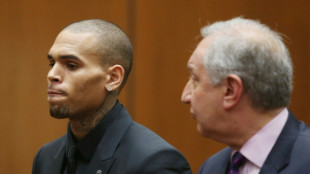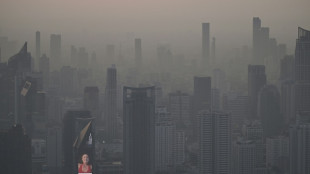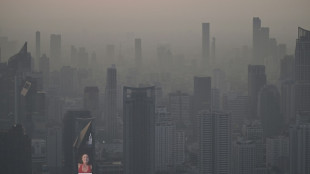
-
 PSG loan France forward Kolo Muani to Juventus
PSG loan France forward Kolo Muani to Juventus
-
'Emilia Perez' tops Oscar nominations in fire-hit Hollywood

-
 Tears, gasps as UK court hears horrific details of stabbing spree
Tears, gasps as UK court hears horrific details of stabbing spree
-
St Andrews to host 2027 British Open

-
 S.African anti-apartheid activists sue govt over lack of justice
S.African anti-apartheid activists sue govt over lack of justice
-
Cocaine seizures in Rotterdam down sharply

-
 Keys shocks Swiatek to set up Sabalenka Australian Open final
Keys shocks Swiatek to set up Sabalenka Australian Open final
-
Formula One drivers face new sanctions for swearing

-
 UK to make case to Trump against whisky tariff: finance minister
UK to make case to Trump against whisky tariff: finance minister
-
After Musk gesture, activists project 'Heil' on Tesla plant

-
 Career-high 54 for Gilgeous-Alexander as Oklahoma City roll Utah
Career-high 54 for Gilgeous-Alexander as Oklahoma City roll Utah
-
ICC prosecutor seeks arrest of Taliban leaders over persecution of women

-
 Syria's economy reborn after being freed from Assad
Syria's economy reborn after being freed from Assad
-
Shoppers unaware as Roman tower lurks under French supermarket

-
 PSG finally click and fire warning shot to European rivals
PSG finally click and fire warning shot to European rivals
-
Saudi crown prince promises Trump $600bn trade, investment boost

-
 Unstoppable Sabalenka playing 'PlayStation tennis' says Badosa
Unstoppable Sabalenka playing 'PlayStation tennis' says Badosa
-
Sabalenka to take Badosa shopping after Melbourne rout - and pay

-
 Man City step up rebuild with signing of Marmoush for £59 million
Man City step up rebuild with signing of Marmoush for £59 million
-
Stocks mainly rise after Wall Street's AI-fuelled rally

-
 Palestinian official says hundreds leave Jenin as Israel presses raid
Palestinian official says hundreds leave Jenin as Israel presses raid
-
Sabalenka beats Badosa to make third straight Australian Open final

-
 Singer Chris Brown sues Warner Bros for $500 mn over documentary
Singer Chris Brown sues Warner Bros for $500 mn over documentary
-
J-pop star Nakai to retire after sexual misconduct allegations

-
 More than 250 Bangkok schools close over air pollution
More than 250 Bangkok schools close over air pollution
-
Leaky, crowded and hot: Louvre boss slams her own museum

-
 Sabalenka tames Badosa to make third straight Australian Open final
Sabalenka tames Badosa to make third straight Australian Open final
-
Man City step up rebuild with Marmoush signing

-
 Kremlin ready for 'mutually respectful' Trump talks
Kremlin ready for 'mutually respectful' Trump talks
-
Negligence played key role in Turkey ski resort deaths: expert

-
 Celtic cash in on Champions League lifeline offered by new format
Celtic cash in on Champions League lifeline offered by new format
-
Real Madrid break billion-euro revenue barrier to top Money League

-
 Man City sign forward Marmoush from Eintracht Frankfurt
Man City sign forward Marmoush from Eintracht Frankfurt
-
WWF blasts Sweden, Finland over logging practices

-
 How things stand in China-US trade tensions with Trump 2.0
How things stand in China-US trade tensions with Trump 2.0
-
Most Asian markets rise after Wall Street's AI-fuelled rally

-
 Colman to kick off Sundance as film world reels from LA fires
Colman to kick off Sundance as film world reels from LA fires
-
Chief US diplomat vows 'unwavering support' for Israel

-
 Fire-hit Hollywood awaits Oscar nominees, with 'Emilia Perez' in front
Fire-hit Hollywood awaits Oscar nominees, with 'Emilia Perez' in front
-
Nearly 200 Bangkok schools close over air pollution

-
 Daring attack pays off for Spain's Romo in Tour Down Under win
Daring attack pays off for Spain's Romo in Tour Down Under win
-
Napoli host arch-rivals Juventus riding wave of Scudetto enthusiasm

-
 Alpine skiing: Five things about the Kitzbuehel downhill
Alpine skiing: Five things about the Kitzbuehel downhill
-
J-pop star Nakai to retire after sex misconduct allegations: media

-
 New rider in town: Somalia's first woman equestrian turns heads
New rider in town: Somalia's first woman equestrian turns heads
-
Melbourne doubles feud as Kichenok accuses Mladenovic of 'direct threat'

-
 Trump to take virtual centre stage in Davos
Trump to take virtual centre stage in Davos
-
Friedrich Merz: millionaire conservative on verge of German chancellery

-
 Trump's return darkens mood as Germany heads to elections
Trump's return darkens mood as Germany heads to elections
-
Pochettino happy after 'amazing' USA beat Costa Rica


How things stand in China-US trade tensions with Trump 2.0
Donald Trump is back in the White House, promising to use the United States's vast economic weight to hit back at China for its alleged unfair trade practices and role in the deadly American fentanyl crisis.
This week, the mercurial magnate said 10 percent tariffs on all Chinese imports could kick in on February 1 -- and on the campaign trail touted a levy as high as 60 percent.
China has warned that there are "no winners" in a trade war and vowed to defend its economic interests.
Here's where the China-US trade relationship stands:
- How much trade is at stake? -
Trade between China and the United States -- the world's two largest economies -- is vast, totalling more than $530 billion in the first eleven months of 2024, according to Washington.
Over that same period, sales of Chinese goods to the United States totalled more than $400 billion, second only to Mexico.
According to the Peterson Institute of International Economics (PIIE), China is the dominant supplier of goods from electronics and electrical machinery, to textiles and clothing.
But a yawning trade imbalance -- $270.4 billion for January to November last year -- has long raised hackles in Washington.
As has China's vast state support for its industry, sparking accusations of dumping, as well as its perceived mistreatment of US firms operating in its territory.
But China's economy remains heavily reliant on exports to drive growth despite official efforts to raise domestic consumption -- making its leaders reluctant to change the status quo.
- What happened during Trump's first term? -
Trump stormed into the White House in 2016 vowing to get even with China, launching a trade war that slapped significant tariffs on hundreds of billions of dollars of Chinese goods.
China responded with retaliatory tariffs on American products -- particularly affecting US farmers.
Key US demands were greater access to China's markets, broad reform of a business playing field that heavily favours Chinese firms, and a loosening of heavy state control by Beijing.
After long, fraught negotiations the two sides agreed what became known as the "phase one" trade deal -- a ceasefire in the nearly two-year-old trade war.
Under that agreement, Beijing agreed to import $200 billion worth of US goods, including $32 billion in farm products and seafood.
But in the face of the pandemic and a US recession, analysts say Beijing fell well short of that commitment.
"In the end, China bought only 58 percent of the US exports it had committed to purchase under the agreement, not even enough to reach its import levels from before the trade war," PIIE'S Chad P Brown wrote.
"Put differently, China bought none of the additional $200 billion of exports Trump's deal had promised."
- How did things change under Biden? -
Trump's successor Joe Biden did not roll back increases imposed by his predecessor, but took a more targeted approach when it came to tariff hikes.
Under Biden, Washington expanded efforts to curb exports of state-of-the-art chips to China -- part of a broader effort to prevent sensitive US technologies being used in Beijing's military arsenal.
His administration has also used tariffs to take aim at what it called China's "industrial overcapacity" -- fears the country's industrial subsidies for green energy, cars and batteries could flood global markets with cheap goods.
Last May, Biden ordered $18 billion worth of imports from China be slapped with tariffs, accusing Beijing of "cheating" rather than competing.
Under the hikes, tariffs on EVs quadrupled to 100 percent, while the tariff for semiconductors will surge from 25 percent to 50 percent.
The measures also targeted strategic sectors such as batteries, critical minerals and medical products.
Both sides have also launched investigations into the others' alleged unfair trade practices with probes into dumping and state subsidies.
- What happens next? -
With Biden gone, all eyes are on whether Trump will follow through on these threats -- or if the rhetoric was an opening gambit in negotiations.
Trump has long viewed tariffs as a bargaining tool -- an "all-purpose bludgeon", according to a Wall Street Journal editorial.
He has also tied tariffs to the fate of Chinese-owned social media app TikTok -- warning of retaliation if a deal cannot be struck to sell it.
Many breathed a sigh of relief when a "shock and awe" blitz of executive orders signed on Trump's first day in office did not feature tariffs on Chinese goods.
But Trump did order a sweeping review by top officials into a number of Chinese trade practices -- with reports due by April 1.
"Although no immediate tariff hike is an upside surprise, extended uncertainty may still weigh on confidence," HSBC economists wrote in a note Wednesday.
"That said, the lack of concrete tariffs at this juncture may suggest that Trump is open to further negotiations with China," they added.
N.Fournier--BTB
